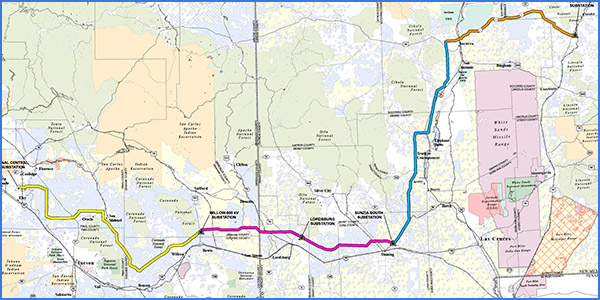By Hudson Sangree
New Mexico regulators approved construction this month of what could be the Western Hemisphere’s largest wind farm, capable of generating as much power as a mid-sized nuclear power plant. But whether all that energy will have a way to reach the load centers of California and the Southwest remains unclear after the regulators denied approval for new transmission lines meant to link the wind project to urban areas.
On Oct. 3, the New Mexico Public Regulation Commission voted 4-0 to allow Pattern Development’s Corona Wind Projects to move forward. Pattern’s plans call for construction of up to 950 wind turbines with the potential to produce 2,200 MW of electricity. That’s about the same capacity as Pacific Gas and Electric’s Diablo Canyon nuclear power plant, the last in California, which is scheduled to retire by 2025.
In September, however, the PRC declined to let the SunZia Southwest Transmission Project go ahead, citing unresolved concerns, especially that the developers had “failed to sufficiently define the location of the transmission line route for which it seeks approval.” The commissioners denied the project without prejudice so that SunZia’s developers could firm-up their plan and resubmit it.
“We didn’t have any animus against the project at all,” PRC Vice Chair Cynthia B. Hall said. “They just weren’t ready. Things weren’t coming together in the time frames expected.”
With last-minute changes to SunZia’s submissions, “What was actually being requested became sort of a moving target,” Hall added.
SunZia’s $2 billion transmission project would consist of two bidirectional 500-kV lines with a total rating of 3,000 MW. Its proposed 520-mile path from central New Mexico south across the Rio Grande and the Sonoran Desert in Arizona has met with resistance from federal agencies, the military, environmentalists, community groups and ranchers since it was first proposed in 2008.
Some of those concerns have been resolved, particularly with the U.S. Bureau of Land Management and Defense Department, whose land the lines would cross or abut, but problems with some private landowners persist.
Today SunZia’s fate is linked with the Corona project, which would be the line’s anchor tenant.
On Tuesday, SunZia emailed RTO Insider a statement saying, “The PRC approval of Pattern’s Corona Wind Projects is a very positive development for SunZia and New Mexico.
“The Corona Wind Projects are the anchor tenants for SunZia’s first line,” it continued. “This approval paves the way for SunZia to provide the PRC (and the hearing examiner [HE]) with the additional information they need to be able to approve the location of SunZia. We expect to provide this information to the PRC (and HE) in early 2019.”
For its part, Pattern urged the commissioners to weigh each project on its own merits for permitting purposes, despite the close connection between Corona and SunZia.
“They agreed that our permit should stand on its own,” said Crystal Coffman, business development manager for affiliate Pattern Energy Group, based in Houston.
Hall said the commissioners were impressed with Pattern’s compliance and planning efforts. “They had everything nailed down,” she said. And the commissioners also were excited about New Mexico potentially being home to the hemisphere’s largest wind farm. “It sure gives us a sense of pride at the moment,” she said.
Adam Renz, who handles government relations and external affairs for Pattern Energy, said the company was planning to work with SunZia on its next PRC filing to help ensure the transmission line’s approval. A major goal for the West’s biggest wind farm would be to supply energy to California as it seeks to meet its 100% clean-energy target by 2045. (See Can Calif. Go All Green Without a Western RTO?)
The best way of doing that would be through SunZia’s high-voltage lines, sending energy across the Southwest to CAISO’s territory, Renz said.
“SunZia has always been a bit of a dream project that would allow us to deliver electrons into CAISO,” he said. “At the end of the day it’s a direct long-lead line into California.”





